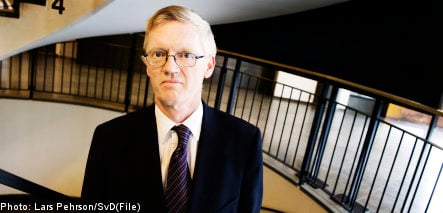The copyright protection organisations in which Norström is a member take a standpoint on the issue and actively lobby for tougher legislation within copyright law, according to a report by Sveriges Radio (SR).
The Local reported on April 23rd that Tomas Norström is a member of Svenska föreningen för upphovsrätt (‘the Swedish Copyright Association’) and sits on the board of Svenska föreningen för industriellt rättsskydd (Swedish Association for the Protection of Industrial Property).
These memberships automatically make him a member of the international organisations ALAI and AIPPI.
The president of AIPPI, Thierry Mollet-Vievill, confirmed in an interview with SR that the group represents “copyright owners and their lawyers” and argued that the law must be followed.
“We try to fight against the infringement of copyright legislation and piracy.”
The chairperson of ALAI (Association littéraire et artistique internationale), Victor Nabhan, confirmed to SR that the group is a lobby organisation.
“When a new law proposal is under consideration ALAI issues a comment. In that sense we are a lobby organisation…We try as far as we can to protect the individual interests of the copyright holder.”
Nabhan confirmed that his views are representative of the association, including its Swedish branch, and that all its members should share them.
According to experts interviewed by SR, many of whom elected to remain anonymous, the new details support arguments in favour of a retrial.
“The confidence in the legal system demands that the appeals court regards this is as a conflict of interest, and that means that the appeals court must order a retrial in the district court,” said Eric Bylander, a legal expert at Gothenburg University told SR.
The judge in the case, Tomas Norström declined to issue any further comment on the details saying only that it was for the appeals court to consider the issue.
The four men connected to The Pirate Bay were convicted of being accessories to copyright infringement by a Swedish court on April 17th.
Fredrik Neij, Gottfrid Svartholm Warg, Peter Sunde and Carl Lundström, were each sentenced to one year in prison and ordered to pay 30 million kronor ($3.56 million) in damages. They have all appealed their convictions.



 Please whitelist us to continue reading.
Please whitelist us to continue reading.
Member comments